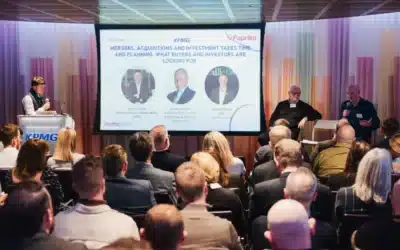It might be difficult for agency founders to say “no” to things but it can become the key to growth writes David Eccles, founder of Leeds-based agency Numiko.
One New Year’s Eve, back in the mid-noughties, I made a pledge to say “yes!” to anything that made me feel uncomfortable. It was a great year, and I did a lot of things I normally
wouldn’t.
This led to lots of personal growth and, both happily and surprisingly, no criminal prosecutions. I was an incredibly nervous public speaker back then, but in January, I said “yes!” to speaking at a Bettakultcha event at Leeds Town Hall to an audience of 500 people.
In March, I said “yes!” to speaking at an international documentary festival in Italy. In June, I said “yes!” and pitched a project to the BBC at the Cannes Film Festival in front of a live audience and streamed globally. Saying “yes!” forced me out of my comfort zone to become comfortable with something I had previously avoided at all costs.
As a personal development tactic, I would highly recommend saying “yes!” to things that make you uncomfortable. However, when it comes to what projects and opportunities you take on as an agency, I’ve found that the opposite is a true. Saying “no!” is your superpower.
Owners of agencies tend to be an optimistic and entrepreneurial bunch. They see the best in people and projects and that’s why they do what they do. Saying “yes!” leads to new clients and new projects that provide the all-important cashflow that agencies live or die by.
Often, we forget the advice that we give clients; that the essence of strategy is choosing what not to do. Any strategic agency worth its salt will tell its client that they need to be distinctive; but it’s hard to stand out as an agency in such a crowded marketplace. Behind the strap lines, mission statements and core beliefs, most good agencies pretty much do the same things very well.
Great work is an expectation, not a differentiator. What clients really look for are like-minded people who they enjoy working with. What we’ve found differentiates us are the things we say “no” to. I wish I could say this was some clever strategy we came up with, but it wasn’t. It was a gut feeling for what we felt good spending our time doing. We felt good helping organisations that are making a positive difference to the world. We wouldn’t have felt so good helping companies sell oil, weapons, or other obviously bad things. We’d probably feel pretty meh about helping organisations sell trainers or electric toothbrushes. So, we started saying “no” to things that we weren’t excited about.
This led to us working with a certain type of client, which then led to us working with more clients like that. But what was really interesting, was that is also attracted like-minded
people to join our team. These people have the same values and motivations in how they wanted to spend their time. And when you have a group of people all motivated by the same thing, that’s the basis of a really strong culture.
Saying no can be hard. When you’re approached with a new project that falls outside of your target verticals or usual expertise there’s always a pressure to go for it regardless. There are targets to hit, bills to pay and you can always tell yourself it’s just this once. But as the cliché goes, reputations take a long time to build and seconds to break.
Generally, the “no” can only come from you. As the founder or director of the agency, it’s ultimately your call, and what you’ll find is that even if you’ve clearly outlined what sectors
you’re targeting, your well-meaning business development team will be keen to bring in work and it will fall to you to make that crucial decision of saying no.
I can only speak for Numiko, but in our experience our key to growth has been focus, and saying no has enabled that focus. The truth is, saying no never gets easier. When a potential client is keen to work with you, but you think they’re just not the right fit, it’s tough turning that down. It feels like you’re holding things back, preventing the growth that you’re working to achieve.
But in the long-term, the best way to grow is by building your reputation and your distinctiveness. By developing the focus that makes your agency unique and allows you to stand out.











